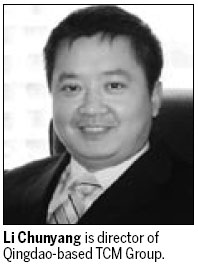China
Men in black a thing of the past - in debt collecting
By Wang Chao (China Daily)
Updated: 2010-10-15 11:00
 |
Large Medium Small |
BEIJING - Wearing black suits and dark sunglasses, they sneak into the house and leave threatening letters - if necessary, they become ruthless killers to complete their mission.
That is how debt collectors are depicted in many soap operas, but Li Chunyang says that is far from the truth.
"It is not the way we do business. You don't need to be a gangster to collect debt," said Li, director of the Qingdao-based TCM Group, an international debt collection company that started in 1997.
"More than 20 years ago, collectors in some countries used threats and personal harassment to claim debts, but that practice has almost died out."
Unlike the strong and intimidating debt collectors in TV programs, Li has fair skin and a warm smile, and speaks slowly and softly. He has been collecting debts for 15 years and said he is among the first to be involved in this business.
Debt collection is also his first job. After graduating with a degree in American Literature major in 1995 from a local university he started work with a debt collection company affiliated to Shandong foreign trade bureau.
"The job sounded exciting, but it was actually quite boring," Li said.

"They employed me because I can speak good English, and they had many foreign debtors."
Every day Li would start work with calls - and end with calls. He also had to drum up business by calling export companies in southeastern China and ask if they needed debt collection services.
"Only five out of 100 companies would consider outsourcing their debt collection to us, others just hung up," Li said, "Most of them treated me as an annoying insurance seller."
After two years, Li quit and started his company. "Debt collection is not a very transparent business in China, but since we are claiming debt for Chinese companies from overseas, we got acquiescence from the government."
However, even if they successfully get an assignment, the chances to recover the money are quite dim. Li said among 100 cases in the Middle East and Africa, only 5 percent can end up with some money. The highest claim rate is 40 percent, in Europe.
Li said since "no collection, no fee" is an industry norm, his company doesn't spend a lot traveling to debtors, instead, it sends e-mails and letters to the debtors (mostly companies), in which it warns them of possible lawsuits if they do not repay the money.
If the debtors owe money to foreign clients and are close by, they may also get personal visits to negotiate a settlement.
Without much traveling, Li's company only employs 13 people; but it doesn't mean the work requires no expertise.
"We have to be very familiar with the local laws, or else we may end up in jail for personal harassment," Li said.
In the United States, laws tend to protect the right of debtors. A debt collection company has to wait for 14 days after they contact the debtors through e-mail or mail before further action can be taken. In some states, if a debt collector knocks at the door to collect debts, he risks being shot.
On average, Li can get two to four cases every month, but after the financial crisis, he is getting more from Chinese companies since many foreign business partners have gone bankrupt.
"Now I can get six to seven cases every month," Li said.
"Most of the cases are related to overdue booth fees on international exhibitions, or unpaid student loans from overseas Chinese students, mostly several thousand dollars."
While the amounts owed in each case range from $10,000 to $500,000, only 20 to 30 percent would be successful.
Last year, the company recovered 20 million yuan ($3 million), earning about 30 percent in commission. The amount recovered for foreign companies was about $400,000.
Most foreign jobs come through TCM, an international debt collection association comprising members from more than 40 countries. In return, each member pays an annual membership fee from $3,000 to $6,000.
China Daily